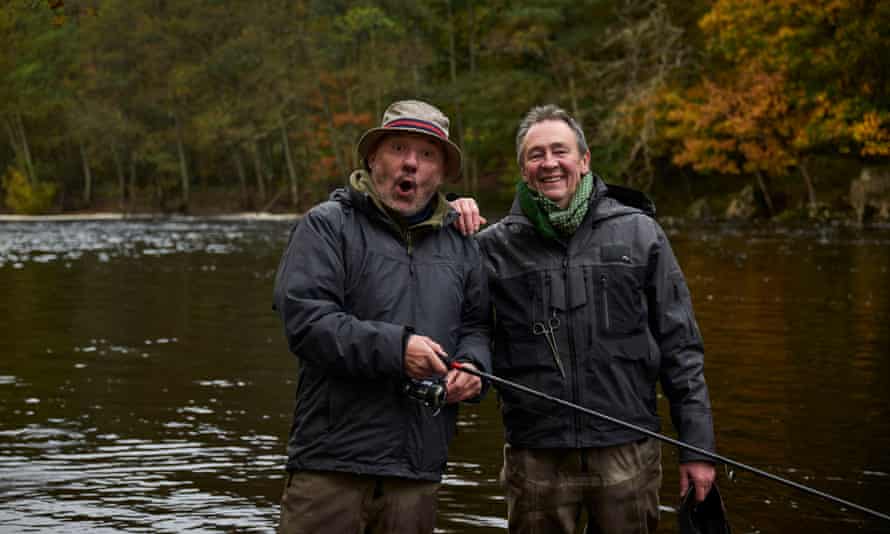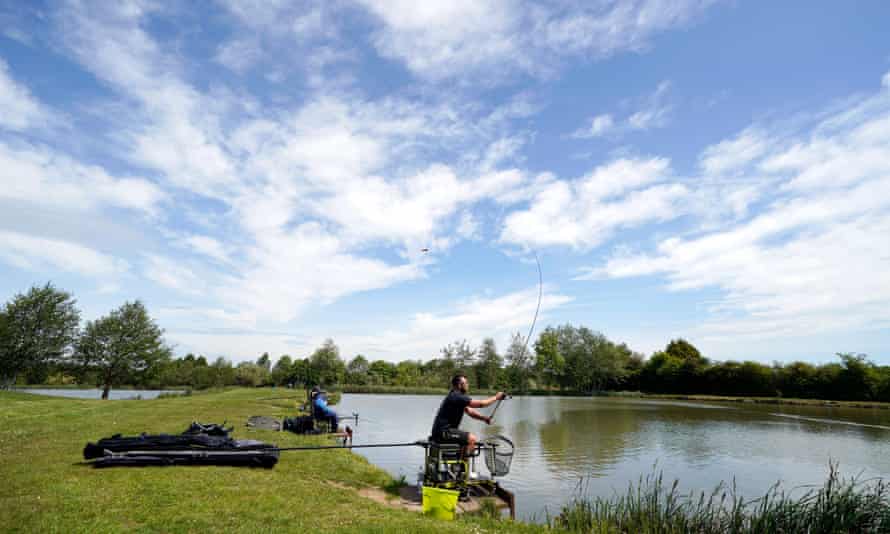Retailers that specialise in fishing tackle are struggling to keep up with demand as thousands of people have taken up angling as a pandemic pastime and a physically distanced way to enjoy the outdoors.
The number of annual rod licence applications in England and Wales surged by more than 120,000 in 2020, up 15% on the previous year, according to the Environment Agency, with a big increase in the number of women and families heading to the waterside.
About 8% of licences issued last year went to women, up from 5% in an average year. But almost a third of new licence applicants in the 15-44 age group were from women, with much of the increase thought to be a result of mums seeing fishing as a cheap and accessible way to get their children out and about while so many other sporting activities, such as football and indoor swimming, were locked down.
The sport has also benefited from evidence it can be good for mental health – something highlighted by the lockdown TV hit Gone Fishing, featuring the comedians Bob Mortimer and Paul Whitehouse musing on life, death and friendship by various rivers and waterways.
Taking up a rod and reel is now even available on prescription. Greater Manchester Mental Health Trust has partnered with a local fishing organisation, Tackling Minds, to help patients with problems such as depression and anxiety.
The increasing popularity of fishing is part of a general rise in the appreciation of outdoor life and nature during the coronavirus pandemic alongside outdoor swimming, walking and even naturism.

Coarse fishing in rivers is not an all-year-round pastime in England. There is a close season on all rivers, some canals and some still waters, such as lakes, from 15 March to 15 June.
But angling clubs have been overwhelmed with new recruits, with the most popular now closed to new members. At Ashfield Angling Club, whose 1,300 members have access to venues in Nottinghamshire and Yorkshire, 1,427 people joined the waiting list in 2020, more than double the number in 2019.
“Everybody we speak to has seen a big increase in membership,” says John Cheyne, the national regions manager for the Angling Trust, the national governing body for angling in England.
“For people on furlough with a lot of time to kill and not wanting to spend a lot of money, angling is a pretty cheap way to spend all day out in nature. Even if golf courses are open, they cost you quite a bit and you have got to pay again [each time].”

Derek Holmes, a committee member at Lure Anglers Canal Club based in Warwickshire, said the group had nearly doubled its membership to almost 500 last year with numbers really taking off in March when fishing was named as one of the few activities allowed.
“We saw a massive surge in numbers through the year. Fishing is cheap and easy to do. It became a way for [people] to get outside and was one of the few sports you could actually take part in,” Holmes said.
This week, the major fishing retailer Angling Direct said its annual sales had risen 27% to almost £68m despite its stores being closed for months. Argos reported its sales of fishing kit were up 300% on last year. It has introduced new ranges under the name of the TV angler Matt Hayes and has “availability issues” with some items because of high demand.
Fishing isn’t expensive to get started. It is possible to pick up a starter rod and reel kit and a licence for two people for less than £65, although that cost could double for permission to fish in some rivers, lakes and ponds.
Ian Welch of Farlows, an upmarket “rural pursuits” store that sells online and from a flagship store in Pall Mall in London, said web sales have risen 70%, with sales of beginner kits more than doubling.
“When the government put the word out that fishing was permitted, we saw a huge increase in demand for all fishing tackle but especially beginners kits with everything you need – just add water,” Welch said.
“Demand is still very much out there,” he said. “[Fishing] does seem to have connected with people in a way it hasn’t done before. It is seen as a family activity that connects with the environment.”
Sign up to the daily Business Today email
Cheyne of the Angling Trust thinks the pastime’s popularity will continue even when the pandemic is over. When the Environment Agency asked new fishing licence applicants if they would renew this year, only 2% said definitely not and almost 86% said they would. More than 40% had gone fishing more than 10 times since buying their licence.
“It’s become clear that getting out into the great outdoors and enjoying nature is on the increase,” he said. “When you are angling you are trying not to disturb nature and you see a lot. Nature doesn’t realise you are there and just gets on with it. Its very absorbing and you are concentrating really hard on something that doesn’t really matter, and that’s fantastic for you if you are stressed.”
This content first appear on the guardian
